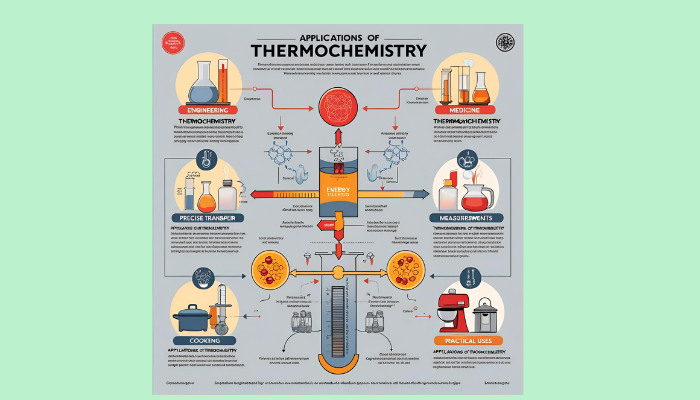Thermochemistry: An In-depth Overview
Thermochemistry is the branch of physical chemistry that studies the heat energy involved in chemical reactions and physical changes. It focuses on understanding the energy changes, primarily heat transfer, during chemical transformations.
Key Concepts of Thermochemistry
- System and Surroundings: The part of the universe under study is called the system, and everything else is the surroundings.
- Types of Systems: Open, closed, and isolated systems depending on energy and matter exchange.
- Energy Forms: Heat (q), work (w), and internal energy (U) are central to thermochemical processes.
- Enthalpy (H): Heat content of a system at constant pressure.
Heat and Work
Heat (q) is the energy transferred between the system and surroundings due to temperature difference. Work (w) is energy transfer when force is applied through distance. The change in internal energy (ΔU) of a system is related to heat and work by:
ΔU = q + w
Enthalpy (H) and Heat Changes
Enthalpy is defined as:
H = U + PV
Where P is pressure and V is volume. At constant pressure, the heat absorbed or released by the system equals the change in enthalpy (ΔH). If ΔH is negative, the reaction is exothermic (releases heat); if positive, it is endothermic (absorbs heat).
Applications of Thermochemistry

- Determining heat changes during reactions (combustion, formation, neutralization).
- Calculating energy efficiency in engines and fuels.
- Studying reaction spontaneity in conjunction with entropy and free energy.
- Designing industrial chemical processes with optimal energy usage.
Note: Thermochemistry bridges the gap between chemistry and physics by explaining how energy flows in chemical processes, making it fundamental to understanding reaction behavior and designing practical applications.
MCQ Quiz
- Which equation defines the change in internal energy?
a) ΔU = q + w
b) ΔU = H + PV
c) ΔU = q – w
Answer: a) ΔU = q + w - What type of reaction absorbs heat from surroundings?
a) Exothermic
b) Endothermic
c) Isothermal
Answer: b) Endothermic - Enthalpy at constant pressure is equal to:
a) Heat absorbed or released
b) Work done by the system
c) Internal energy only
Answer: a) Heat absorbed or released
True/False
- Exothermic reactions have a positive ΔH. False – They have negative ΔH.
- Thermochemistry only deals with chemical reactions, not physical changes. False – It studies both.
